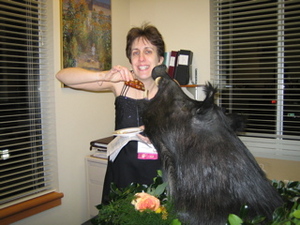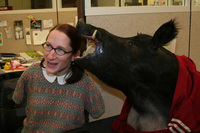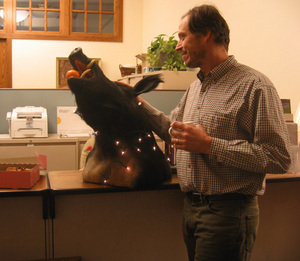Have you heard the Reed myth about a group of people dressed in black druidic robes, marching in a hallowed procession that includes a cappella singing, torches, and a boar’s head on a pallet? Or perhaps you’ve witnessed it yourself on a frosty winter’s night? This curious scene isn’t just lore; it remains a beloved feature of the annual alumni holiday party. This yuletide celebration dates to the college’s early years, with the boar’s head procession appearing in the 1920s and becoming quite the beloved tradition.
For a time the boar’s head procession also made an appearance at the winter formal held by students in the Student Union after classes had ended for the semester. I have fuzzy warm memories of somber notes by a bagpiper cutting through the smoky haze to herald the procession. Nobody had prepared first-year students for this sight, thus it was all the more magical and mysterious to witness the robed figures winding through the silenced crowd. I’ve attended nearly every alumni holiday party since graduation and still find the spectacle utterly mesmerizing.
For many years in England, a roasted boar’s head has been associated with holiday feasting. The custom may be associated with the Norse practice of sacrificing a boar to the god Freyr during the winter solstice, in order to gain his favor in the new year. It seems that the tradition moved from Scandinavia to England with St. Stephen, whose feast day is December 26. The “Boar’s Head Carol” dates to the 15th century, and the words and tune used in Reed’s performance are the same as those sung every Christmas at Queen’s College, Oxford.

Learn more about this carol and the Oxford version of boar lore in the recent issue of Reed magazine, including the tale of the student who was attacked on Christmas Day by a wild hog. Also, enjoy these photos of Mela and Mike with Boris in years of olde.
Whether you celebrate the twelve days of Christmas, the eight nights of Chanukah, or another solstice-season ritual, we hope that you’ll be able to join us for this festive occasion on campus on Saturday, December 18. See details and online registration.

